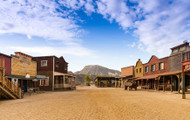Popular Old West Sayings Still In Use Today
Nov 6th 2018
 Ever wonder why you call "shotgun" when you want the front seat? Or why, when you need to take charge, someone will say to "take the bull by the horns?" Many idioms and phrases we use today originated in the lawlessness of the Old West. Often these Western colloquialisms meant something else when they were originally used; however, over the course of history, their meaning has changed. Let's take a look a few popular idioms and delve into their origins.
Ever wonder why you call "shotgun" when you want the front seat? Or why, when you need to take charge, someone will say to "take the bull by the horns?" Many idioms and phrases we use today originated in the lawlessness of the Old West. Often these Western colloquialisms meant something else when they were originally used; however, over the course of history, their meaning has changed. Let's take a look a few popular idioms and delve into their origins.
When a person says you are "dressed to kill," they mean you look impressive, often wearing chic, high fashion clothes. Today, we take this saying as a compliment. Back in the Old West, though, this phrase had a very different meaning. Although, like many idioms, there is debate as to the true origin of the phrase, with some saying it is a British term; Americans in the Old West made it their own. Some scholars argue that "to kill" is British slang meaning "to impress," Americans in the Old West took a much more literal approach. "Dress to kill" simply meant a man wearing double guns. Or literally dressing to kill.
What about the ever-so-popular "riding shotgun," which has morphed in recent years to simply "shottie" when a person wants the front seat of the car? This phrase is actually a little tricky; most people believe that it refers to the person sitting next to the driver of a stage coach, holding a shotgun and thus protecting the stage's cargo. Men did, in fact, ride next to the driver and carry shotguns. They were often called express messengers or shotgun messengers. The actual phrase "riding shotgun" does not appear to have actually been used in the Old West. Instead, the term shotgun messenger was used. "Ride Shotgun" did appear in print in 1919; however, the term doesn't seem have stuck, until Hollywood started using it in the 1939 classic "Stagecoach."
If you call "shotgun" faster than your friends, it could be said that you "grabbed the bull by the horns." What does grabbing a bull's horns have to do with taking control of a situation? According to Tim Bowen, the phrase came from ranchers and cowboys who had the dangerous task of trying to control steer. Steer are large powerful animals that can easily maim or kill a man. What these cowboys discovered was the only way to subdue these animals was to take them head on, "by the horns" and wrestle them to the ground.
If you play poker you are most likely familiar with what's known as "dead man's hand," a make-up of aces and eights. What does this hand have to do with a dead man, though? Originally " dead man's hand" was used in 1886. Interestingly, though, it was not the hand we are familiar with today; instead, it consisted of three jacks and a pair of tens, thus making it a full house. The aces and eights combination came into notoriety in the 1920s after books were published on the famous Western showman, Wild Bill Hickok. Legend has it; Hickok was holding two black aces and two black eights when he was shot in the back by Jack McCall in 1876. This, however, has never been historically verified. Still, it does make a great story and idiom that is still used by card players today.
The Wild West provided many colloquialisms still in use by Americans today, even if we don't know the origin. These phrases continue to change both in wording and meaning as new generations adopt them.

